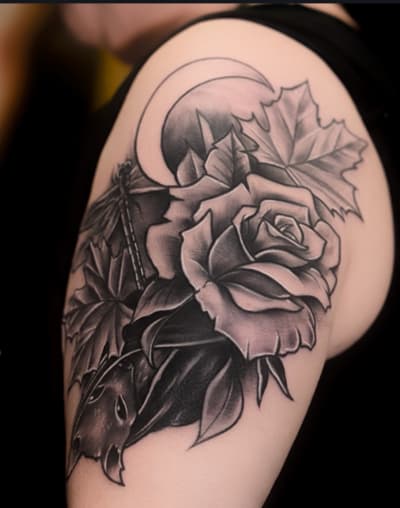The Enduring Paradox of Tattoo Stigma and Identity
Hello, I'm Jose, inviting you to explore the intricate tapestry of tattoos, particularly the stigma that has shadowed this art form for centuries. At Sueño Tattoo in the vibrant heart of Laurel, MD, we provide a sanctuary for individuals eager to narrate their life stories through ink.
As a tattoo artist with over eight years of experience, I've witnessed how tattoos can serve as both personal badges of honor and societal targets. Despite increasing acceptance, outdated stereotypes still influence perceptions, impacting everything from employment opportunities to personal relationships. Let's delve into the origins of this paradox and why it endures.
The Historical Roots of Tattoo Stigma
Tattoos boast a rich history, dating back over 5,000 years to Ötzi the Iceman. However, their journey is riddled with stigma. Historically, tattoos were tools of control, as detailed in Sophie Luzier's study, "Most Vulgar and Barbarous: A History of Tattoo Stigma." In ancient cultures, tattoos marked slaves and criminals. In Greece, the term "stigma" originated, denoting disgrace—a legacy that persists today.
In the East, tattoos symbolized punishment and rebellion, as seen in Japan's Edo period, where criminals were branded, linking tattoos to organized crime. The 20th century brought another dark chapter with the Holocaust, where tattoos dehumanized prisoners, underscoring their oppressive use.
In America, the narrative was equally complex. The 19th-century sideshow phenomenon of "Tattooed Ladies" perpetuated colonial and anti-Indigenous sentiments, further stigmatizing tattoos as symbols of the "other."
Modern Times: Coexistence of Acceptance and Stigma
Today, tattoos have surged in popularity, with CBS News reporting that about a third of American adults have at least one tattoo. Millennials lead this trend, with over 40% inked compared to 13% of baby boomers. Yet, prejudice lingers.
Outdated stereotypes fuel bias against tattooed individuals, with assumptions about character that don't reflect reality. In workplaces, appearance policies can legally discriminate against tattoos, presenting hurdles for those with visible ink.
Studies by Broussard and Harton show that individuals with tattoos often face harsher character judgments, despite being perceived as stronger and more independent. These partial positives don't outweigh the overall negative bias.
The Psychological Gap: Tattoos and Personality
The psychological gap between tattoo stigma and reality reveals entrenched biases. Research using the Brunswik Lens Model highlights that while observers agree on perceived personalities of tattooed individuals, these judgments are largely inaccurate. Tattoos, as identity claims, are not reliable indicators of personality.
Tattoos as Identity Claims
Tattoos are a profound form of self-expression, a way to etch your identity onto your skin. At Sueño Tattoo, you're not just seeking ink—you're asserting your narrative. Each design is a collaborative dialogue, culminating in art that speaks volumes.
I've crafted designs reflecting deeply personal stories—whether memorializing a loved one or celebrating heritage with traditional American tattoos. Tattoos can empower, symbolizing triumph or cherished moments. They should never invite judgment or discrimination.
Moving Beyond Stigma
The journey of tattoos from stigmatized marks to celebrated identity symbols continues. As a society, we must dismantle outdated stereotypes and embrace tattoos as legitimate self-expression. This requires challenging discriminatory workplace practices and acknowledging that tattoos don't define competence or trustworthiness.
Education is pivotal in this shift. By understanding tattoo stigma's historical roots and recognizing modern realities, we foster a more inclusive society. Tattoos today are vibrant art forms deserving respect and acceptance.
Frequently Asked Questions
Why do tattoos still have a stigma?
Stigma originates from historical uses of tattoos as marks of degradation and entrenched stereotypes linking them to rebellion or crime. Despite growing acceptance, these perceptions persist.
How can I discuss my tattoos in a job interview if I'm worried about stigma?
Prepare by discussing your tattoos positively, focusing on personal storytelling. Highlight your skills and qualifications to shift focus from appearance to ability.
Are tattoos a reliable indicator of someone's personality?
No. While tattoos reflect personal narratives, stereotypes about tattoos and personality often don't match reality, as studies show.
What are the legal aspects of tattoo discrimination in workplaces?
Employers can enforce appearance policies restricting visible tattoos unless it discriminates against a protected class.
How has the perception of tattoos changed over generations?
A generational divide exists, with millennials and Gen Z more accepting of tattoos as self-expression, while older generations hold traditional views.
What should I consider before getting a tattoo to avoid stigma?
Consider placement and style, especially in professional settings. Opt for areas that can be easily covered, mindful of potential career and social implications.
Can tattoos affect personal relationships?
Yes, as preconceived notions may influence relationships. Open communication about your tattoos' meaning can bridge understanding and reduce biases.
Conclusion
Tattoos have traveled far from marks of shame to celebrated personal expressions. Yet, the journey continues. We must challenge stereotypes and embrace the diversity tattoos represent. Each tattoo tells a story—a glimpse into the wearer's soul deserving appreciation and respect.
If you're in Laurel, MD, and wish to explore how a tattoo can narrate your journey, visit Sueño Tattoo. Let's converse about art, identity, and the stories that define us.
